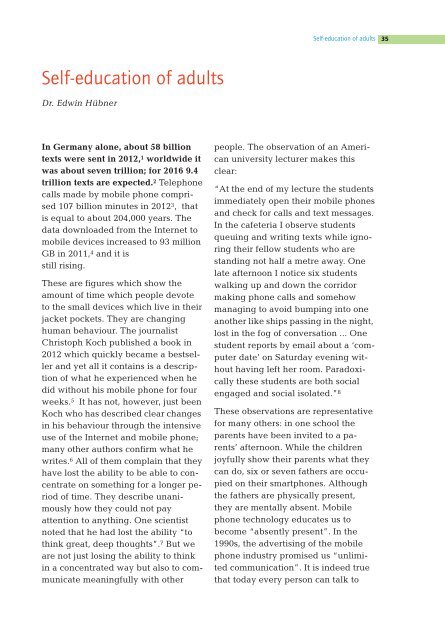Struwwelpeter 2.0
Struwwelpeter_engl_August_2015
Struwwelpeter_engl_August_2015
- No tags were found...
Create successful ePaper yourself
Turn your PDF publications into a flip-book with our unique Google optimized e-Paper software.
Self-education of adults 35<br />
Self-education of adults<br />
Dr. Edwin Hübner<br />
In Germany alone, about 58 billion<br />
texts were sent in 2012, 1 worldwide it<br />
was about seven trillion; for 2016 9.4<br />
trillion texts are expected. 2 Telephone<br />
calls made by mobile phone comprised<br />
107 billion minutes in 2012 3 , that<br />
is equal to about 204,000 years. The<br />
data downloaded from the Internet to<br />
mobile devices increased to 93 million<br />
GB in 2011, 4 and it is<br />
still rising.<br />
These are figures which show the<br />
amount of time which people devote<br />
to the small devices which live in their<br />
jacket pockets. They are changing<br />
human behaviour. The journalist<br />
Christoph Koch published a book in<br />
2012 which quickly became a bestseller<br />
and yet all it contains is a description<br />
of what he experienced when he<br />
did without his mobile phone for four<br />
weeks. 5 It has not, however, just been<br />
Koch who has described clear changes<br />
in his behaviour through the intensive<br />
use of the Internet and mobile phone;<br />
many other authors confirm what he<br />
writes. 6 All of them complain that they<br />
have lost the ability to be able to concentrate<br />
on something for a longer period<br />
of time. They describe unanimously<br />
how they could not pay<br />
attention to anything. One scientist<br />
noted that he had lost the ability “to<br />
think great, deep thoughts”. 7 But we<br />
are not just losing the ability to think<br />
in a concentrated way but also to communicate<br />
meaningfully with other<br />
people. The observation of an American<br />
university lecturer makes this<br />
clear:<br />
“At the end of my lecture the students<br />
immediately open their mobile phones<br />
and check for calls and text messages.<br />
In the cafeteria I observe students<br />
queuing and writing texts while ignoring<br />
their fellow students who are<br />
standing not half a metre away. One<br />
late afternoon I notice six students<br />
walking up and down the corridor<br />
making phone calls and somehow<br />
managing to avoid bumping into one<br />
another like ships passing in the night,<br />
lost in the fog of conversation ... One<br />
student reports by email about a ‘computer<br />
date’ on Saturday evening without<br />
having left her room. Paradoxically<br />
these students are both social<br />
engaged and social isolated.” 8<br />
These observations are representative<br />
for many others: in one school the<br />
parents have been invited to a parents’<br />
afternoon. While the children<br />
joyfully show their parents what they<br />
can do, six or seven fathers are occupied<br />
on their smartphones. Although<br />
the fathers are physically present,<br />
they are mentally absent. Mobile<br />
phone technology educates us to<br />
become “absently present”. In the<br />
1990s, the advertising of the mobile<br />
phone industry promised us “unlimited<br />
communication”. It is indeed true<br />
that today every person can talk to


